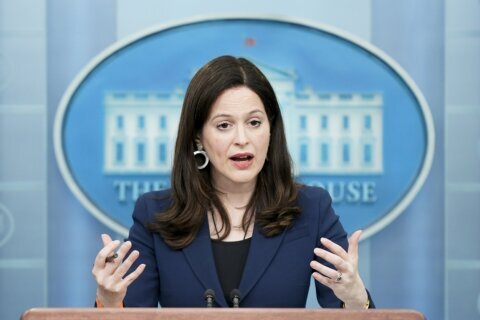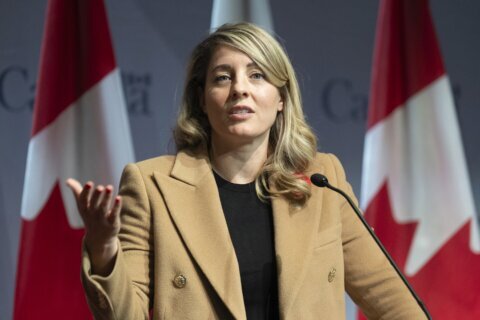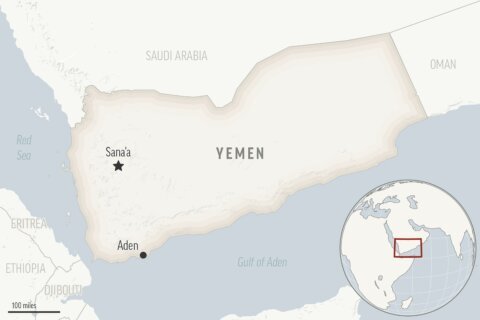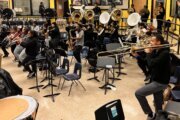UNITED NATIONS (AP) — It was a moment the diplomatic world was watching for — but didn’t get.
In the end, Ukrainian President Volodymyr Zelenskyy and Russian Foreign Minister Sergey Lavrov avoided staring each other down Wednesday across the U.N. Security Council’s famous horseshoe-shaped table. Zelenskyy left before Lavrov arrived.
The near-miss was somewhat to be expected. Yet the moment still spoke to the U.N.’s role as a venue where warring nations can unleash their ire through words instead of weapons. The choreography also underscored the world body’s reputation as a place where adversaries sometimes literally talk past each other.
Zelenskyy denounced Russia as “a terrorist state” while Russian Ambassador Vassily Nebenzia sat facing him near the other end of the table’s arc. As Zelenskyy launched into his remarks, the Russian looked at his phone, then tucked the device away.
Zelenskyy left before Lavrov’s arrival, which came as U.S. Secretary of State Antony Blinken was accusing Russia of having “shredded” key provisions of the U.N. Charter.
Lavrov, in turn, reiterated his country’s claims that Kyiv has oppressed Russian speakers in eastern areas, violating the U.N. charter and getting a pass on it from the U.S. and other western countries. Across the table was Ukrainian Ambassador Sergiy Kyslytsya, his eyes on his phone during at least parts of Lavrov’s remarks. (Blinken, for his part, took handwritten notes.)
If there was no finger-pointing face-off, the atmosphere was decidedly prickly.
Before Zelenskyy’s arrival, Nebenzia objected to a speaking order that put the Ukrainian president before the council’s members, including Russia. (Albanian Prime Minister Edi Rama, the meeting chair, retorted: “You stop the war, and President Zelenskyy will not take the floor.”)
Zelenskyy had been in the same room, but hardly eye to eye, with a Russian diplomat during the Ukrainian leader’s speech Tuesday in the vast hall of the U.N. General Assembly, which this week is holding its annual meeting of top-level leaders. (Russian Deputy Ambassador Dmitry Polyansky later said, wryly, that he’d been focusing on his phone and “didn’t notice” Zelenskyy’s address.) Before that, Zelenskyy last encountered a Russian official at a 2019 meeting with President Vladimir Putin.
There’s a long history of delegates walking out on rival nations’ speeches in the council and other U.N. bodies, and it’s not unusual for speakers to duck in and out of Security Council meetings for reasons as simple as scheduling. The group’s member countries must have a presence during meetings but can fill their seats with any accredited diplomat.
Ukraine isn’t a member but was invited to speak. Ahead of the meeting, Zelenskyy suggested that U.N. members needed to ask themselves why Russia still has a place on a council intended to maintain international peace and security.
There have been verbal fireworks — by diplomatic standards, at least — during the council’s scores of meetings on the war. And even the seating chart was a sticking point last year when Lavrov and Ukrainian Foreign Minister Dmytro Kuleba both attended a council meeting that, like Wednesday’s, happened alongside the General Assembly’s big annual gathering.
The two foreign ministers had no personal interaction at that 2022 session, which Lavrov attended only briefly, to give his speech. But beforehand, a placard marking Ukraine’s seat was moved after Kuleba apparently objected to its placement next to Russia’s spot.
This time, the two countries’ seats were separated from the start.
___
Associated Press journalists Mary Altaffer at the United Nations and Emma Burrows in London contributed.
Copyright © 2024 The Associated Press. All rights reserved. This material may not be published, broadcast, written or redistributed.







